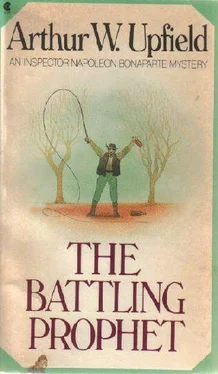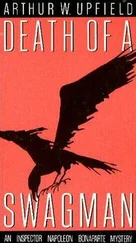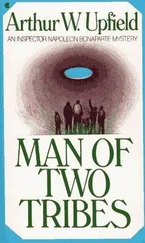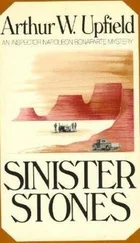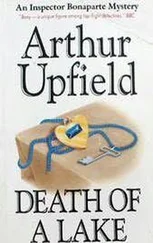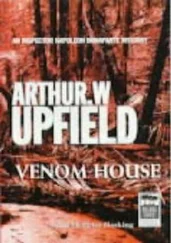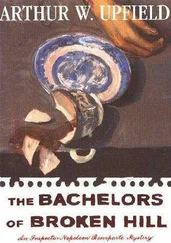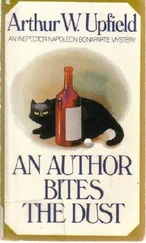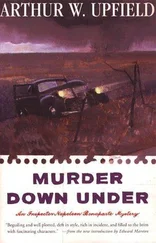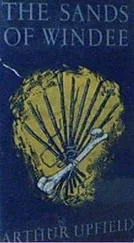Arthur Upfield - Battling Prophet
Здесь есть возможность читать онлайн «Arthur Upfield - Battling Prophet» весь текст электронной книги совершенно бесплатно (целиком полную версию без сокращений). В некоторых случаях можно слушать аудио, скачать через торрент в формате fb2 и присутствует краткое содержание. Жанр: Классический детектив, на английском языке. Описание произведения, (предисловие) а так же отзывы посетителей доступны на портале библиотеки ЛибКат.
- Название:Battling Prophet
- Автор:
- Жанр:
- Год:неизвестен
- ISBN:нет данных
- Рейтинг книги:4 / 5. Голосов: 1
-
Избранное:Добавить в избранное
- Отзывы:
-
Ваша оценка:
- 80
- 1
- 2
- 3
- 4
- 5
Battling Prophet: краткое содержание, описание и аннотация
Предлагаем к чтению аннотацию, описание, краткое содержание или предисловие (зависит от того, что написал сам автор книги «Battling Prophet»). Если вы не нашли необходимую информацию о книге — напишите в комментариях, мы постараемся отыскать её.
Battling Prophet — читать онлайн бесплатно полную книгу (весь текст) целиком
Ниже представлен текст книги, разбитый по страницам. Система сохранения места последней прочитанной страницы, позволяет с удобством читать онлайн бесплатно книгу «Battling Prophet», без необходимости каждый раз заново искать на чём Вы остановились. Поставьте закладку, и сможете в любой момент перейти на страницу, на которой закончили чтение.
Интервал:
Закладка:
Arthur W. Upfield
Battling Prophet
Chapter One
A Regrettable Death
THEcoach captain was young, smart in the grey uniform of the company, and a facile talker. It was obvious that his female passengers found him disturbing; that he was being mentally seduced by those inwhom hope was waning and those whose husbands had exhausted their repertoire.
The voice from the amplifier was pleasing, and grammatical errors easy to condone. Therewas little of the bored tones of the guide, and more often than not the man spoke as though to close friends, as, indeed, the majority of the passengers had become, for they had left Sydney ten days before on this tour to Adelaide and now were on the return journey. Only one man had joined them at Adelaide.
“We are now approaching Murray Bridge,” announced the captain. “As you all know, we are returning to Melbourne via the Princes Highway, and here at Murray Bridge we halt for morning tea. I know you understand how we must keep strictly to schedule, so please don’t go wandering down the street.”
“Not unless you go with me, Captain,” said a middle-aged woman who was good for a solid tip at the end of the tour.
Again on the road a man remarked:
“Country looks terribly dry even this far south.” And the amplified voice said:
“Droughtiestyear for the last seventeen. All across South Australia and Victoria, and high into New South Wales, the man on the land is being hard hit.”
“Old Ben Wickham was right again,” a woman said, and her travelling companion added:
“He’s been right for years, but this time all the farmers believed him. Pity he died.”
Both before and after leaving Border Town the effect of the drought was apparent. There was no new fallow; the grass paddocks were burned brown and patchily bare; there were no green crops. It was as thoughthis were the end of summer and all the thirsty land awaited the autumn rains. But it was early spring, whenall the world should have been bursting with vigorous life. Brown was the universal colouring, broken only by the dark of pine plantations and the barbered gardens of neat homesteads. The district was almost denuded of stock. Of human activity there was none to be seen.
Mount Gambier was ever a thriving town, and important as a police administrative centre. The passenger who had joined the coach at Adelaide changed here to an old bus that connected Mount Gambier with the small fishing village called Cowdry. The way ran over the low hills and climbed to the famed Blue Lake, into which, so said the cynical driver, the Mount Gambier people emptied tons of washing blue every six months. Beyond this serene pool the road crossed bare uplands where even the occasional tree seemed lifeless.
“Depressing, isn’t it,” observed the man from Adelaide, who was seated immediately behind the local driver.
“Yair, looks grim all right,” agreed the driver. “Still, there’s no argument. Old Wickham predicted the drought, and them who wouldn’t believe him deserved what they’re getting. There’s lots of people who howled him down for crying drought, and lots who’ve been on his side. Would have cheered him up if he’d lived.”
“His home was down this way, I understand,” said the Adelaide passenger.
“Yair. Place about twenty thousand acres called Mount Mario. You can see it ahead just right of that line of pines. They took his body to Adelaide for cremation, and flew the ashes back and scattered ’emover Mount Mario. Nice-lookin’ place from the road. I’ll pull up and let you take a peep at it. You’re staying with John Luton, you said. You get off at the bridge.”
“Thanks. Yes, Mr. Luton invited me down for a few days’ fishing. The kingfish are in, he tells me.”
“Coming around. Bit early this year. Where you from?”
To this frank question the passenger proffered a lie, as the driver’s curiosity was due to habit. They came to the line of pines bordering the road and offering a magnificent windbreak to the pasture-lands beyond. Then into the line of trees grew the white sandstone pillars of a gateway, where the bus stopped.
From this point the plebs could get an eyeful of Mount Mario. The wrought-iron gates were swung wide; the driveway ran straight between wide borders of flowing daffodils all the way to the large house crowning a low hillock. There were people on the wide patio, and the oblique rays of the sun gleamed on the chromium of several cars standing against a green wall oflambertianas. To the right of the house of Colonial architecturesquatted an observatory as though denying all interest in the heavens, and still farther to the right was a long building flanked by rows of white boxes on stands and white-painted cylinders elevated like mortar barrels.
There had lived and worked Ben Wickham, who had had many enemies and many followers; a famous meteorologist whose death terminated a stormy career marked by professional jealousy, governmental stupidity, and by fierce opposition from commercial and certain financial interests. From this Mount Mario had been flung challenges; from it had issued defiance of obstruction; to it had looked, with ever-growing confidence, farmers and graziers from all over Australia.
Ben Wickham had predicted that last year would be very dry over certain areas. He named days when slight and useless rain would fall. It was so. He had predicted that this year would be disastrous in named areas. His forecasts had proved to be one hundred per cent accurate. And then, having removed the gamble on the weather for the man on the land, he had died.
The circumstances of his death were not, it might well be said, quite respectable for one of his affluence and renown, and no newspaper reported them. The local doctor did not hesitate to sign the certificate, and the relatives readily carried out the dead man’s wishes regarding the disposal of his ashes… according to the newspapers.
“Yair. Nice place,” repeated the driver, and drove on beside the wind-break following the gentle decline to the bridge which crossed a royal river. “You get out here, sir. That sidetrack’ll take you to Luton’s cottage. Less’nhalf a mile. See you again some time.”
The passenger stood beside the highway and watched the vehicle cross the bridge before taking up his battered suitcase and turning to the unmade road skirting the river-bank. Here grew great gums, and between the trunks the sheen of water dappled with sunlight caught his eye, and that same eye noted the fallen tree litter and the ants working close to their nests, for when the sun set it would be cold.
The river drifted beyond screening gums and lower bush, and presently the track debouched on to an open place where three evenly spaced tree giants guarded the river to the right, and a white-painted picket fence guarded a small weatherboard cottage to the left.
At sight of the stranger, two dogs bounded from the broad veranda to race to the gate and bark with more welcome than hostility. When the wayfarer spoke, they turned themselves into the shape of an S, and escorted him along the cinder path dividing plots of growing vegetables. Reaching the veranda ahead, they barked again, and this time there was the faint note of house guardians.
Then the front door swung open and on to the veranda stepped a man.
He was twice the traveller’s weight, seemed half as high again, and was certainly twice his age. The white hair, clipped short, was plentiful. The full white moustache failed to hide the stern mouth and the rugged chin. Most men begin to decline at forty; this one hadn’t begun to decline at eighty.
“Good day-ee!” drawled the traveller in the manner of the inland. “Are you John Luton?”
“I was thismornin ’ when I woke up,” replied Mr. Luton, examining his visitor with eyes extraordinarily clear and vital. “I think I know who you are, but tell me.”
Читать дальшеИнтервал:
Закладка:
Похожие книги на «Battling Prophet»
Представляем Вашему вниманию похожие книги на «Battling Prophet» списком для выбора. Мы отобрали схожую по названию и смыслу литературу в надежде предоставить читателям больше вариантов отыскать новые, интересные, ещё непрочитанные произведения.
Обсуждение, отзывы о книге «Battling Prophet» и просто собственные мнения читателей. Оставьте ваши комментарии, напишите, что Вы думаете о произведении, его смысле или главных героях. Укажите что конкретно понравилось, а что нет, и почему Вы так считаете.
